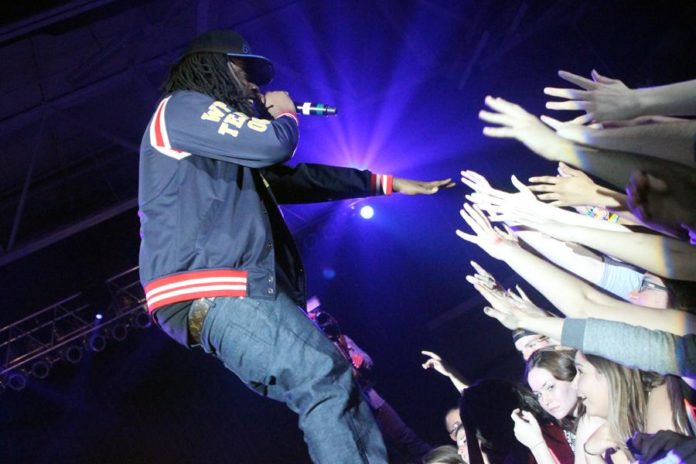Saggy pants, half-naked women, drug and alcohol abuse, violence and explicit content are just some of the stereotypes that plague the hip-hop industry.
Kevin Woods, also known as Chevy Woods, began his journey into the industry alongside his friend Cameron Thomaz (Wiz Khalifa).
The pair, along with several other artists, are part of the Taylor Gang record label. Taylor Gang began as a fan base network but eventually expanded into a record label.
Khalifa’s career took off after the release of “Black and Yellow” in 2011. He released several mixtapes prior to the hit song, but the tribute to Pittsburgh caught national attention and threw him into the spotlight.
Woods and Khalifa have kept a close relationship throughout their breakouts into mainstream success.
“We started off together,” Woods said. “It didn’t matter if something happened for me or something happened for him. I’m happy for him and I’m supportive of everything he’s doing. I have a new single out now, so he’s supporting me. Taylor Gang is everything.”
Being able to get into the mainstream in any genre is a difficult task. Artists spend hours writing songs, performing at local venues, promoting themselves and doing everything they can to get the right people to notice them.
Olubowale Akintimein, better known as Wale, also fought through some of the same struggles that upcoming artists experience.
“You have to lead the way and be your own biggest critic,” Wale said. “You have to invest in yourself.”
Wale and Chevy Woods were brought together this past weekend, along with Juicy J (Jordan Houston) and BAS (Abbas Hamad), by the Slippery Rock University Program Board for the university’s spring concert. Universities across the nation bring in artists to perform for students and many artists use the opportunity as a time to better connect with fans.
“On a smaller stage, it’s more intimate,” Woods said. “I just try to get the whole crowd into it.”
Woods briefly attended Robert Morris University before pursuing his career as a hip-hop artist. The rapper received many calls from former college friends during RMU’s tournament game against the University of Kentucky last year.
“I’m fairly well-removed from college but it was cool,” Woods said. “My friend was like ‘Yo, are you watching the game?’ and he was surprised I said yes.”
The connection that artists have with their fans helps to keep them inspired and enjoying what they do.
“My connection with the consumer and the real fans runs deep,” Wale said. “I’m very connected to them, for better or worse.”
Wale said that he uses his connection with the fans as inspiration when he’s working on new tracks.
Both Woods and Wale said that they try to ignore the negative stereotypes that people place on the hip-hop industry.
“I think assumption is the worst thing,” Woods said. “I think [critics] don’t know any better. There’s a lot going on, legal and illegal, but it’s a lot of work to do what we do. I just try to do what’s right, stay grounded and stay positive.”
Wale agreed with Woods and said that he feels that critics often use the negativity to benefit themselves.
“They use it when it’s convenient,” Wale said. “They use it to sell cheeseburgers and computers and stuff like that. You have to take it with a grain of salt.”
The industry, like many others, will always have its critics but artists are continuing to break down barriers and fight their way to the top.








